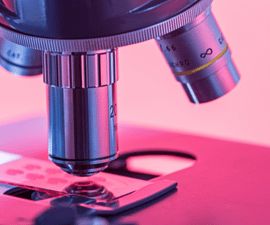
Understanding Lymphoma
Diagnosing Lymphoma
The only way to be absolutely sure of a diagnosis of lymphoma (or any other cancer) is for a doctor to conduct medical tests including performing an excisional biopsy to remove an entire lymph node or an incisional biopsy to remove a portion of the diseased tissue. A pathologist will examine a portion of this biopsy sample under a microscope to see if it contains any lymphoma cells and, if possible, to identify the specific type of lymphoma.
A surgical pathologist is a doctor who specializes in the diagnosis of diseases by studying the cells from a patient’s blood, body fluids, and tissue samples. A hematologist specializes in the pathology of blood cells, and a lymphoma pathologist specializes in the diagnosis and classification of Hodgkin lymphoma (HL) and non-Hodgkin lymphoma (NHL). These doctors are trained to recognize different cell types by looking at the shape and size of cells and how they are grouped inside a tissue.
In addition to routine pathology analyses, portions of biopsy samples will be used for other tests to confirm the diagnosis and to more exactly identify the specific subtype of lymphoma.
A doctor will discuss the risks, benefits, and side effects associated with procedures necessary to diagnose the patient’s particular situation. Share questions and concerns with the doctor so that a course of action can be decided together.
Receive individualized support and information. Call the LRF Helpline:
800-500-9976
helpline@lymphoma.org
Questions to Ask When Discussing Procedures:
- Why is the procedure necessary?
- What will the procedure tell about my condition?
- Can the same information be obtained another way?
- What is involved in doing this procedure?
- Where will I have the procedure done?
- Will I have to do anything to prepare for the procedure?
- How long will the procedure take? Will I be awake? Will I feel pain?
- How long will it take for me to recover from the procedure?
- Should anyone else be present when I have the procedure?
- Will I need someone to take me home afterward?
- When will I know the results?
- When will we talk about the results?
- What will be my out-of-pocket costs?
More Information

TYPES OF DIAGNOSTIC TESTS
Doctors need the results of different diagnostic tests to accurately determine whether or not a patient has lymphoma. These tests can also determine a patient’s specific lymphoma subtype.

STAGING AND PROGNOSIS
Staging is used to describe how widely the lymphoma has spread in patients. Doctors use the stage of disease, along with test results and other factors, to decide the best time to begin treatment and what treatments are likely to be the most effective for each patient.

GETTING A SECOND OPNION
Before starting any type of treatment, a patient may consider getting a second opinion–especially if some characteristics of the diagnosis are complicated or uncertain. The purpose of the second opinion is not to question the doctor’s expertise but to make sure that the suggested treatment plan is reasonable and optimal for the patient’s particular case.
